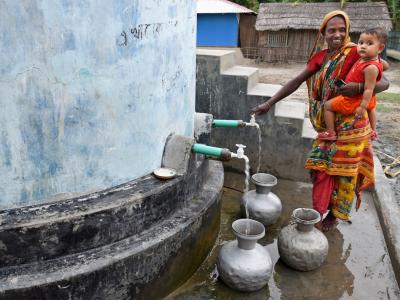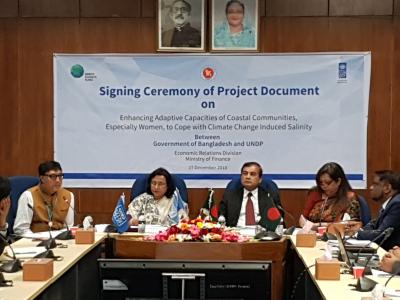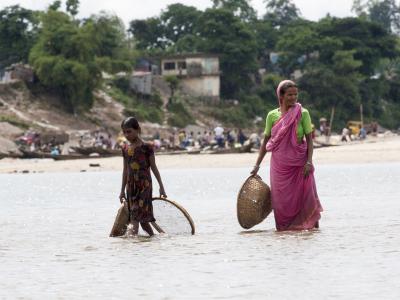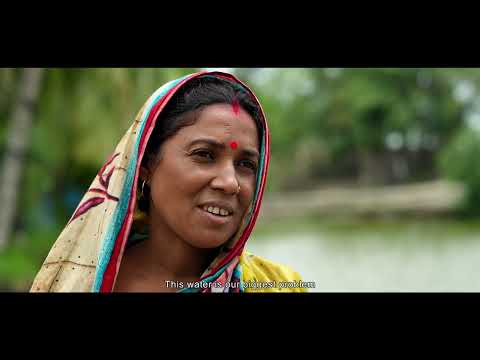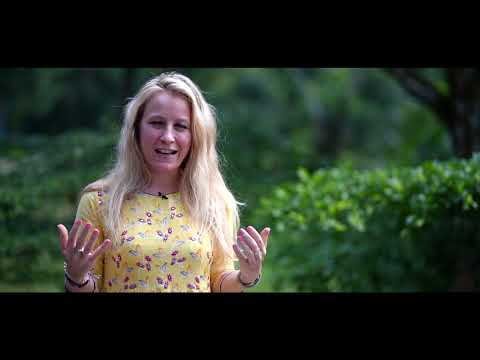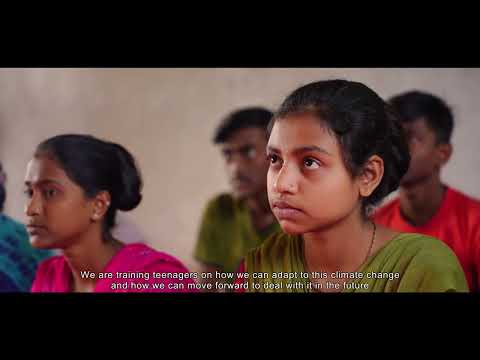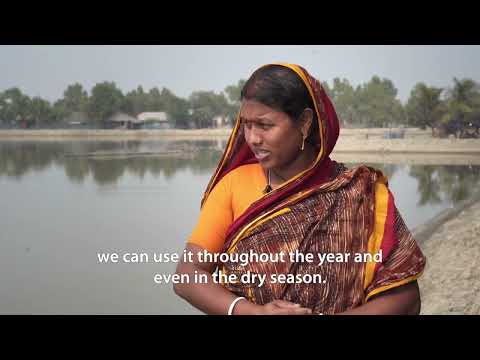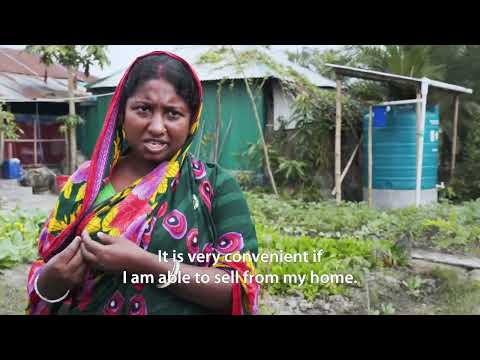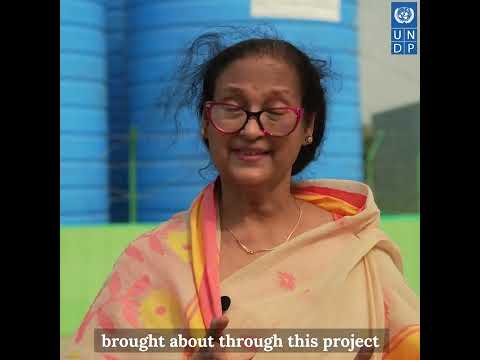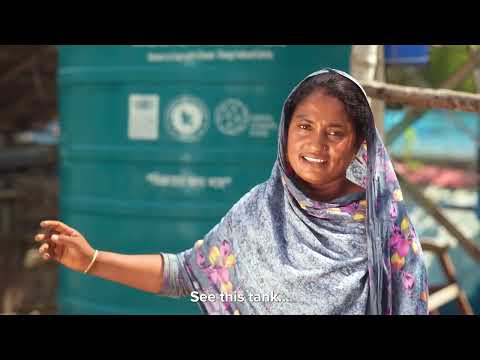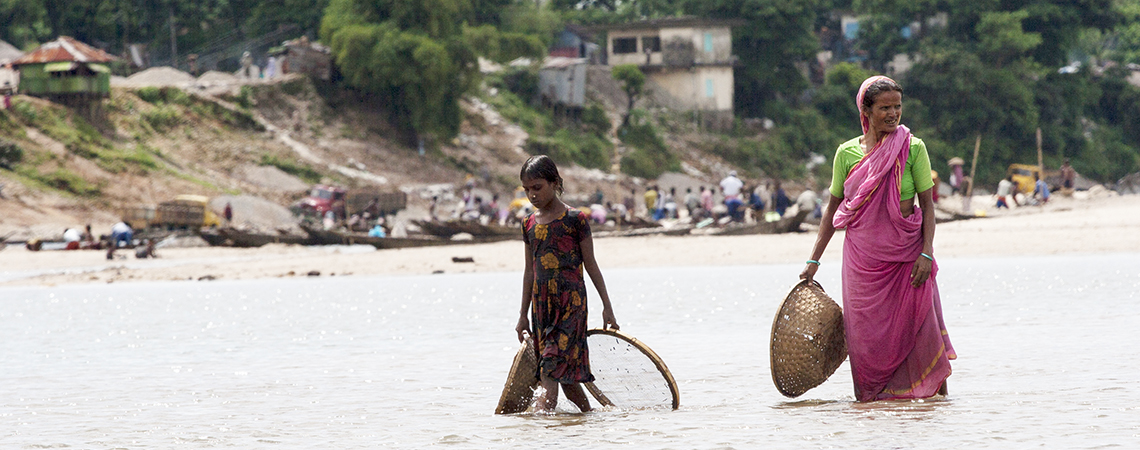
Photo:
Lead by the Bangladesh Ministry of Women and Children Affairs, this project focuses on strengthening the adaptive capacities of coastal communities, especially women and adolescent girls, to cope with impacts of climate change-induced salinity on their livelihoods and water security.
The 6-year project focuses on the Southwestern coastal districts of Khulna and Satkhira, both of which frequently experience cyclones and tidal flooding and experience severe drinking water scarcity due to salinity.
Under the project, communities will be empowered as ‘change-agents’ to plan, implement, and manage resilient livelihoods and drinking water solutions.
The project will promote a paradigm shift away from a focus on short-term responses and technology-led interventions towards community-centric solutions that build ownership and capacities across multiple stakeholders, to sustain and scale-up adaptive responses to safeguard livelihoods and water security.
An estimated 719,229 people (about 245,516 directly and 473,713 indirectly) are set to benefit.
- Community
- District
- National
- National Governments
- Non-Governmental Organizations
An estimated 719,229 people (about 245,516 directly and 473,713 indirectly) are set to benefit from this project.
- Green Climate Fund
- United Nations Development Programme (UNDP)
Expected outcomes
Output 1. Climate-resilient livelihoods, focusing on women, for enhanced adaptive capacities of coastal agricultural communities (responsible party for execution of the activities is DWA, department of Ministry of Women and Children Affairs)
Output 2. Gender-responsive access to year-round, safe and reliable climate-resilient drinking water solutions (responsible party for execution of the activities is the Department of Public Health Engineering)
Output 3. Strengthened institutional capacities, knowledge and learning for climate-risk informed management of livelihoods and drinking water security (responsible parties for execution of the activities are DWA and Department of Public Health Engineering)
Output 1. Climate-resilient livelihoods, focusing on women, for enhanced adaptive capacities of coastal agricultural communities (responsible party for execution of the activities is DWA, department of Ministry of Women and Children Affairs)
Activity 1.1 Enterprise- and community-based implementation of climate-resilient livelihoods for women
Activity 1.2 Strengthened climate-resilient value-chains and market linkages for alternative, resilient livelihoods
Activity 1.3 Community-based monitoring and last-mile dissemination of early warnings for climate-risk informed, adaptive management of resilient livelihoods
Output 2. Gender-responsive access to year-round, safe and reliable climate-resilient drinking water solutions (responsible party for execution of the activities is the Department of Public Health Engineering)
Activity 2.1 Participatory, site-specific mapping, beneficiary selection, and mobilization of community-based management structures for climate-resilient drinking water solutions
Activity 2.2 Implementation of climate-resilient drinking water solutions (at HH, community, and institutional scales)
Activity 2.3 Community-based, climate-risk informed Operation & Maintenance (O&M) and management of the resilient drinking water solutions
Output 3. Strengthened institutional capacities, knowledge and learning for climate-risk informed management of livelihoods and drinking water security (responsible parties for execution of the activities are DWA and Department of Public Health Engineering)
Activity 3.1 Strengthen the Ministry of Women and Children Affairs’ technical and coordination capacities for design and implementation of gender-responsive, climate-resilient coastal livelihoods
Activity 3.2 Strengthen DPHE capacities for climate-risk informed innovation and management of drinking water solutions across the Southwest coast
Activity 3.3. Establish knowledge management, evidence-based learning, and Monitoring and Evaluation (M&E) mechanisms to promote long-term, adaptive capacities of coastal communities
'UNDP, Government sign $33m climate adaptation project' - The Daily Star, December 28 2018. Secretary to Economic Relations Division (ERD) Monowar Ahmed and UNDP Country Director Sudipto Mukherjee signed the project document at the ERD yesterday.
'Bangladesh to empower women and girls in the face of increasing climate impacts' - UNDP Bangladesh, February 28 2018. The world's largest multilateral fund for climate change action, the Green Climate Fund, has approved almost US$25 million in grant funding in support of Bangladesh’s efforts to build the adaptive capacities of vulnerable coastal communities. With a focus on women and adolescent girls, a new 6-year project is set to benefit 700,000 people living in disaster-prone southwestern districts.
UNDP, Government sign $33m climate adaptation projectThe Daily Star, December 28 2018. Secretary to Economic Relations Division (ERD) Monowar Ahmed and UNDP Country Director Sudipto Mukherjee signed the project document at the ERD yesterday.
'Bangladesh to empower women and girls in the face of increasing climate impacts' - UNDP Bangladesh, February 28 2018. The world's largest multilateral fund for climate change action, the Green Climate Fund, has approved almost US$25 million in grant funding in support of Bangladesh’s efforts to build the adaptive capacities of vulnerable coastal communities. With a focus on women and adolescent girls, a new 6-year project is set to benefit 700,000 people living in disaster-prone southwestern districts.
Overall, the project will benefit 719,229 direct and indirect beneficiaries in vulnerable coastal districts of Khulna and Satkhira (about 16.25 per cent of the total population of the two districts) with 245,516 people directly benefiting from the project interventions in building resilience across water and livelihoods through household, community, government, and partner capacities.
The interventions will provide indirect benefits to 473,713 people to the nearby communities in the targeted Wards and other unions in the 5 Upazilas through integration of climate change concerns into planning and implementation of the mandated agencies as well as the pathways established for replication to other communities through knowledge and learning mechanisms.
The primary measurable benefits that will be realized include:
- 25, 425 women will directly benefit from the interventions to switch to (or phase in) climate-resilient livelihoods with associated 500 people benefiting from capacity building and support to value-chain and market actors.
- 245, 516 people will benefit from timely, gender-responsive early warning information and climate risk reduction strategies, facilitated through the women and girl volunteer groups established by the project at each of the targeted wards.
- 68, 327 females and 67, 783 males will benefit through year-round access to safe and reliable drinking water improving their health and safety, and significantly decreasing the unpaid time burden of women in regards of water collection and thereby creating opportunities for education and/or enhanced income generation.
- 525 government staff will benefit from improved capacities for climate-risk informed planning and implementation of resilient solutions for water and livelihood security.
- The project support to women groups for climate resilient livelihoods options in aquaculture and agriculture yields increased income benefits and enables participation in the formal economy, for a total expected increase in income of USD15 million (over the full life of the project). By providing an alternate higher quality source of water, salt intake by the population in the target communities will substantially decrease deaths and averting quality adjusted life years (the rainwater harvesting technologies have sufficient capacity to provide for basic drinking water needs even in times of low precipitation), for net benefits measuring US$4 million.
A project implementation report will be prepared for each year of project implementation. The annual report will be shared with the Project Board and other stakeholders.
An independent mid-term review process will be undertaken and the findings and responses outlined in the management response will be incorporated as recommendations for enhanced implementation during the final half of the project’s duration.
An independent terminal evaluation will take place no later than three months prior to operational closure of the project.
The UNDP Country Office will retain all M&E records for this project for up to seven years after project financial closure in order to support ex-post evaluations.
Monitoring, reporting and evaluation arrangements will comply with the relevant GCF policies and Accreditation Master Agreement signed between GCF and UNDP.
Link to Interim Evaluation (August 2022)
- UNDPKarma RaptenRegional Technical Advisor - Climate Change Adaptation, UNDP













